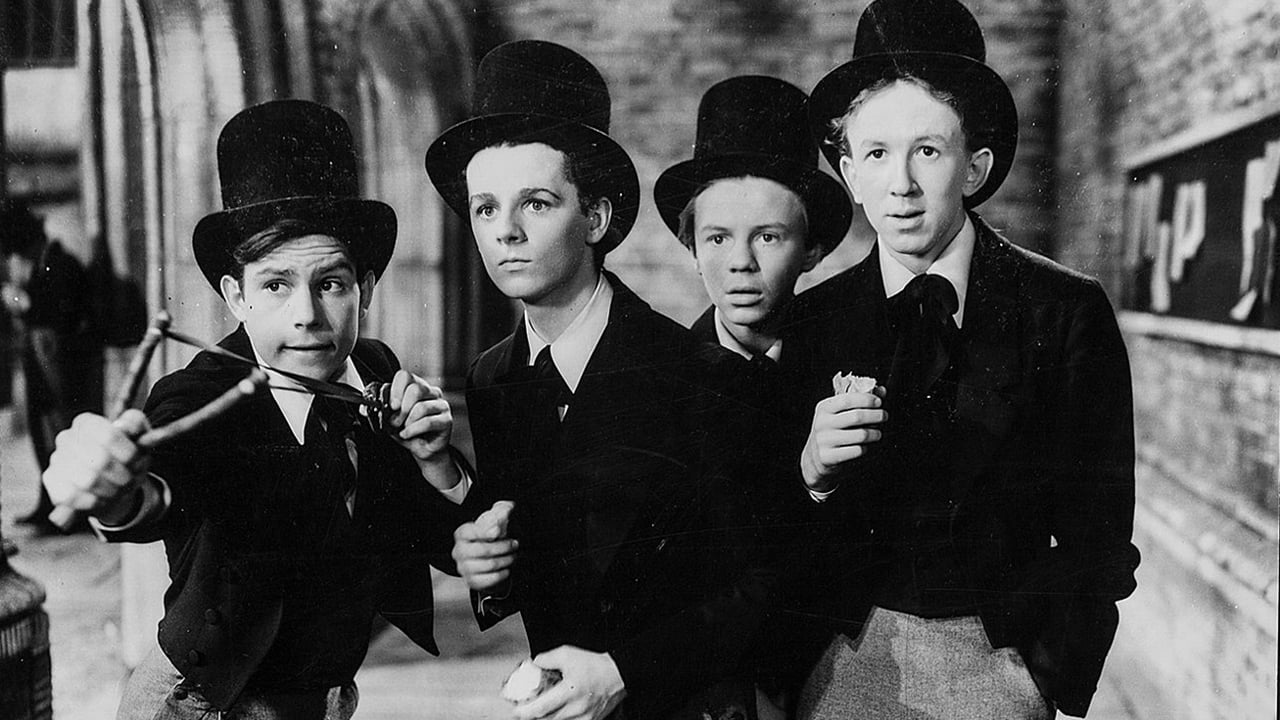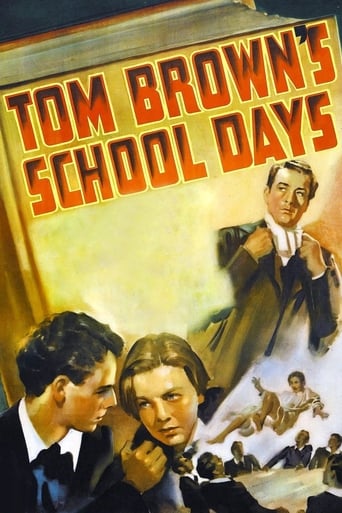



Sorry, this movie sucks
As somebody who had not heard any of this before, it became a curious phenomenon to sit and watch a film and slowly have the realities begin to click into place.
View MoreEasily the biggest piece of Right wing non sense propaganda I ever saw.
View MoreThe film's masterful storytelling did its job. The message was clear. No need to overdo.
View More"Tom Brown's School Days": A novel? A memoir? An autobiography? I think the third is the best description of this schoolboy's time at Rugby, written by "an old boy". Thomas Hughes was not identified as the author of the book until around the time he was re-elected to the House of Commons in 1871. (He had been a member of parliament since 1864). By that time, Doctor Arnold was long dead, but his educational ideas persisted in the British education system until well into the 1960s. However, he is not a major character in the novel. Indeed, he is a somewhat shadowy figure, remote from Tom's immediate world. It was the 1916 movie version that elevated Arnold's importance, and following that lead, it is our 1940 version that virtually makes the influential educationalist the central character.However, I don't think that elevating Arnold's importance detracts from the movie. Far from it! As brilliantly brought to life by Sir Cedric Hardwicke, Arnold is indeed a fascinating, charismatic figure. Hardwicke is not only ideally cast, he rejoices in the best role of his extensive career, demonstrating how he can not only capture an audience's attention and sympathy, but how he can totally dominate the action if given the right script and director.Nevertheless, the supporting players, led by Billy Halop, also turn in outstanding performances. This was probably the only totally unsympathetic role Halop ever played, but he limns the character with a skill that simply rivets the attention. His is the definitive study of a swaggering bully. Of course, Jimmy Lydon never bettered his role as Tom Brown. Freddie Bartholomew is also solidly convincing as East, and there are fine studies from Polly Moran, Josephine Hutchinson, Ernest Cossart and Charles Smith (who was soon to prove Lydon's mainstay in the Aldrich movies).Adroitly directed by Robert Stevenson, and most expansively produced with marvelous sets and evocative photography, this version of Tom Brown's School Days is not only a really gripping, stirring experience, it's an absolute must-see movie – a credit to all concerned!
View Moreone of the best old movies I have ever seen and would like to own it either on DVD or video, its exciting from start to finish, with a great story line even I could understand even at the early age of 14yrs, it has few good actors who in my mind will never be replaced even now. A clean film for all the family, something to get your teeth into with a story line that needs to be watched and listened too. even though black and white the film was well produced for its time and I would love to see it again over and over again. considering the age and the location the film contained beautiful places of interest and lots of great actors, these people will never be seen again which is why we should keep this film ongoing and to the fore front of all films.
View MoreSince this was made, there have been some other very good movie versions of the story, but this adaptation of "Tom Brown's School Days" is still worth seeing. It has a good cast and good atmosphere, with effective story-telling by Robert Stevenson.Cedric Hardwicke is well cast as the stern headmaster Arnold, and the three most important young characters also work well. Jimmy Lydon as Tom, Freddie Bartholomew as his friend and rival East, and Billy Halop as the bully Flashman all give good performances.The boarding school setting is also done effectively, and it works both in creating the right atmosphere and as a period setting. There are times when it pulls you right into the world of the young characters, a world in which they are their own masters in many ways. Their boyish loyalties, threats, fears, rivalries, and misunderstandings all come across believably.On a broader level, it also succeeds in establishing the tension between the adult's (i.e. the headmaster's) goals and the students' goals. Some of the more recent versions have probably done an even better job of communicating the themes while also making the story entertaining, but this one does a solid job as well, and it deserves also to be remembered.
View MoreThis is a film of a work of fiction written by Thomas Hughes in 1857 which featured the life of Thomas Arnold, headmaster of Rugby School from 1828 to 1842, and the name Hughes gave to the principal fictional character in his novel was Tom Brown. There appears to be some significance in this choice of name. Hughes himself attended Rugby school during the period of Dr Arnold's headmastership, this is why he was able to write about the school with such authority; so it appears to me that the character of Tom Brown (and perhaps the entire book) is probably semi-autobiographical - but, somewhat surprisingly, I have never seen this discussed elsewhere.There are many famous schools throughout the world which have modelled themselves, with greater or lesser success, on the British Public School, but collectively the British schools have one unique feature - they created an extremely successful method for perpetuating the rule of the established oligarchy in the U.K. over a period of several centuries when the country was the most powerful in the world. In the U.K. Public Schools are private foundations theoretically open to all, but their high fees meant that education was largely limited to the sons of members of the ruling class, and a Public School education became almost a pre-requisite for admission to a University, election to Parliament or recruitment to any senior government position. It is surprising that, despite this, the Public Schools have always been able to keep a fairly low profile although it is clear that they must have considerable importance both sociologically and historically. Most Englishmen can think of several of the leading Public Schools such as Eton, Harrow, Rugby and Shrewsbury, but few know much about them. Almost the only widely read book dealing with the subject has been "Tom Brown's School Days" the book written by Thomas Hughes on which this film is based. It is a fictional work dealing with the reform of the public school system which started in Rugby under Thomas Arnold, its great headmaster from 1828 to 1842. This was a time when abuses had crept into the system and were beginning to discredit it. At Rugby, Arnold largely stamped out excessive bullying and helped establish ethical standards under which telling tales about fellow students or uttering any untruths became totally unacceptable behaviour. During the process Rugby, which had been a fairly minor Public School, became the leading one in the country. This is the background to Hughes' book, and it also forms an integral part of this film, as well as a remake of it that was released a decade later. Both films were made more than a half century ago but have remained of sufficient interest to justify them retaining ongoing availability on videotape. Nevertheless today this ongoing interest probably arises primarily from readers who have enjoyed the book, former students at one of these schools, educationalists or sociological historians, so today sales of these tapes are probably small and I would guess that we are unlikely to see either film on DVD in the near future. Although the two films are well made, with well acted stories that most people can watch with enjoyment, their unfamiliar scenario would make it unlikely that many of today's movie patrons would make any effort to search them out and this makes rating them a little difficult. PARTIAL SPOILER FOLLOWS - The book relates how Tom Brown goes to Rugby as a new boy and falls victim to the older bully Flashman. Eventually he obtains boxing training and successfully fights Flashman to establish his place in the sun. When Flashman contravenes the unwritten school ethical code Arnold takes the opportunity to expel him and, by the time Tom graduates, the headmaster, together with other boys like him, have succeeded in transforming the old atmosphere in the school. The story in the book is followed fairly closely by this film, which was made in 1940 with the famous and very prolific actor Sir Cedric Hardwicke giving a great performance as the headmaster. Unfortunately, in the U.K. 1940 was the darkest period of World War II and films released then did not attract a great deal of attention, so the film was remade only a decade later with a different cast who also gave a number of very fine performances, and it was spiced up with a much more melodramatic screenplay in which Flashman is not merely a bully but exhibits behaviour verging on the criminal. Since both films provide good meaty stories which most viewers should enjoy, this is one of the rare cases where both an original film and its remake are still worth watching. However for my money I prefer this 1940 film because it is more faithful to the book on which it is based, and (although we can no longer ask anyone what life in the school was actually like in the early nineteenth century) in my opinion is probably much closer to the actual historical story. Primarily because of its somewhat limited appeal I do not think rating this film at more than 6 out of 10 would be justified, but it certainly remains well worth watching by anyone of any nationality with an interest in education.
View More